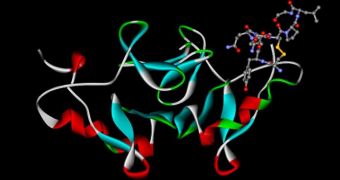According to researchers with the Department of Psychological Medicine at King's College London (KCL), anorexia nervosa patients could benefit from new, oxytocin-based therapies. The team determined in two new studies that the so-called love hormone could be a promising course of treatment against this very serious condition.
Anorexia nervosa is characterized by inappropriate or damaging eating habits and rituals, immoderate food restriction, as well as the obsession with having a thin figure. The eating disorder is also usually accompanied by an irrational fear of gaining weight, and by a distorted perception of one's own body.
In a series of experiments conducted at the university, researchers administered anorexia patients doses of oxytocin, and then watched how they responded to images of high calorie foods, angry faces and fat body parts. The team noticed a significant decrease in all of these behaviors, which are hallmarks of anorexia nervosa. These results highlight the potential benefits of this neurotransmitter as a drug.
Other studies have already demonstrated the benefits of oxytocin in treating or improving symptoms associated with a variety of mental disorders. Some researchers have even demonstrated that this compound is very good at lowering social anxiety levels in people suffering from autism spectrum disorders. In the brain, oxytocin is released naturally during childbirth, breastfeeding and bonding.
“Patients with anorexia have a range of social difficulties which often start in their early teenage years, before the onset of the illness,” explains KCL investigator Dr. Janet Treasure, the senior author on one of the two studies. The work appears in the latest issue of the journal Psychoneuroendocrinology.
“These social problems, which can result in isolation, may be important in understanding both the onset and maintenance of anorexia. By using oxytocin as a potential treatment for anorexia, we are focusing on some of these underlying problems we see in patients,” the researcher goes on to say.
While the first paper dealt with test subjects' reactions to food-related stimuli, the second paper focused on how the same group reacted to seeing facial expressions ranging from anger and disgust to happiness. The second paper is published in the open-access, peer-reviewed journal PLoS ONE.
Usually, anorexia nervosa patients tended to focus more on the expression showing disgust but, after taking oxytocin, they were far less likely to focus on these images. Researchers also determined that participants were less likely to even look at the angry faces.
“Our research shows that oxytocin reduces patients’ unconscious tendencies to focus on food, body shape, and negative emotions such as disgust,” explains the lead author of the second study, Dr. Youl-Ri Kim. The expert is based at the Inje University in Seoul, South Korea, PsychCentral informs.

 14 DAY TRIAL //
14 DAY TRIAL //